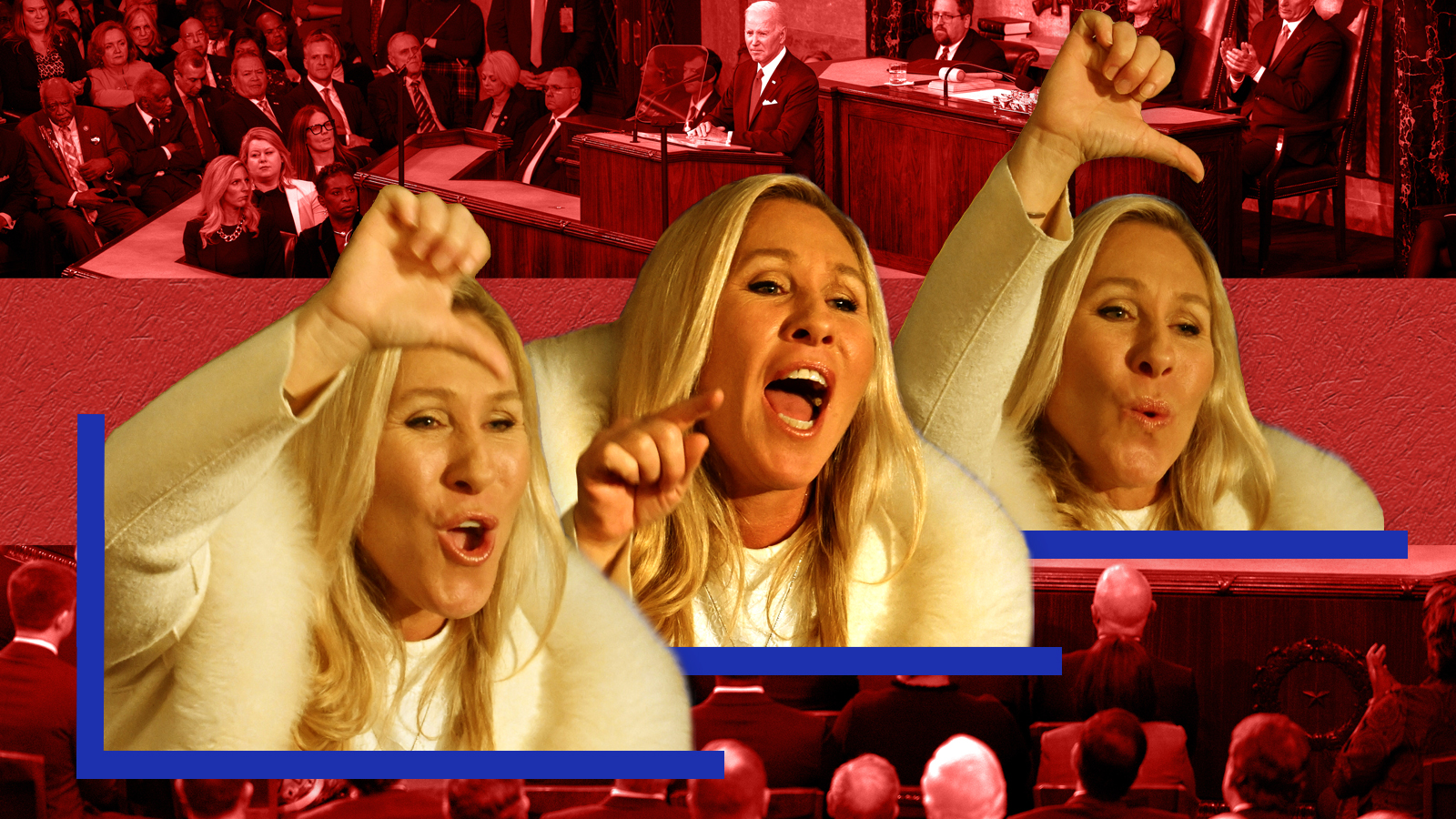Does heckling help — or hurt — the GOP?
The sharpest opinions on the debate from around the web


A free daily email with the biggest news stories of the day – and the best features from TheWeek.com
You are now subscribed
Your newsletter sign-up was successful
House Republicans loudly booed President Biden in an openly confrontational response to his State of the Union address this week. "The raucous peals of 'liar,' 'that's not true' and at least one expletive lobbed at Mr. Biden during his 73-minute address dwarfed outbursts during previous such speeches, most of which have been interrupted by a single disturbance, if at all," according to The New York Times. House members were particularly vocal when Biden said some Republicans want to sunset Social Security and Medicare.
House Republicans are divided on whether the heckling "was inappropriate — or whether it helped them effectively communicate their position to the American public," according to The Hill. Some in the GOP say the shouting was necessary to push back against what they said was an unfair accusation by Biden that conservatives are out to take away Social Security and Medicare. They accuse Biden of "instigating" an outburst to "put Republicans in a bad light," The Hill said. Others think the uproar went too far. Did the heckling help the GOP, or hurt it?
Republicans made themselves look like jerks
The Republicans' heckling of Biden during his State of the Union speech marked "a formal departure from the standards of decorum that have been a hallmark of American democracy since its founding," said the St. Louis Post-Dispatch in an editorial. The standards they threw out the window have always established a respectful tone during political events, from school board meetings to joint sessions of Congress, ensuring "that civility prevails at all times. After all, the public is watching, and people take their cues from their leaders."
The Week
Escape your echo chamber. Get the facts behind the news, plus analysis from multiple perspectives.

Sign up for The Week's Free Newsletters
From our morning news briefing to a weekly Good News Newsletter, get the best of The Week delivered directly to your inbox.
From our morning news briefing to a weekly Good News Newsletter, get the best of The Week delivered directly to your inbox.
The problem with this behavior isn't just that it makes the people throwing the tantrums look like jerks. "In other countries, when standards of decorum break down, lawmakers have been known to physically attack each other and even pull out weapons." These childish "displays of rudeness might be entertaining, but they impede lawmakers from accomplishing the serious business that voters elected them to carry out." And the freedom to speak freely erodes "when catcalls replace informed debate."
Democrats threw civility under the bus first
"Did some congressmen behave badly? Perhaps. But as with kicking members off committees, the Democrats set the precedent," said David Strom in Hot Air. Democrats hurled "gross disrespect" at former President Donald Trump every second he was in the White House. They accused him of treason, hurled insults, and encouraged his aides "to disobey their boss." Then-House Speaker Nancy Pelosi (D-Calif.) made a show of tearing up her copy of Trump's speech at one of his State of the Union addresses. So, please, "I don't want to hear a peep about decorum" from the people who abandoned it first.
Now that both parties have shown they are done with the phony civility, maybe it's time "to end the whole spectacle" of the prime-time State of the Union show. We could "replace it with a weekly, monthly, or even yearly 'question time' along the British model." That would force American presidents "outside the sound-bite-dominated bubble and defending policies would be a lesson to presidents who think they are demigods." It's hard to imagine a pampered U.S. leader surviving that kind of ordeal. Maybe the problem is that our presidents don't get heckled enough.
The GOP's disrupters were following Donald Trump's lead
Actually, the GOP hecklers wouldn't have gotten away with these outbursts in British Parliament, said Karoun Demirjian in The New York Times. "Rowdy debate is a tradition" there, and "members often jeer loudly." But the U.K. has rules against "using expletives or hurling accusations of misconduct, including lying." Congress has rules, too, and but they're "only as strict as the speaker charged with enforcing them," and House Speaker Kevin McCarthy (R-Calif.) showed he doesn't have enough control over his fellow Republicans to lay down the law.
A free daily email with the biggest news stories of the day – and the best features from TheWeek.com
That suggests this kind of behavior will only fester, and possibly get worse. This event will now forever be remembered for the "images of Representative Marjorie Taylor Greene, her mouth wide open as she booed and gave a thumbs down to the president." The spectacle "reflected the ethos that has come to define the Republican-led House, where an emboldened right wing that styles itself after former President Donald J. Trump is unapologetic about its antipathy for Mr. Biden and eager to show it in attention-grabbing ways." This is the new normal.
The GOP tantrum was a gift to Biden
Conservatives heckled Biden at every turn, said Eric Levitz in New York magazine's Intelligencer. The "loudest uproar" came when Biden said "some Republicans" have called for letting Medicare and Social Security sunset, even though Sen. Rick Scott (R-Fla.) has done just that. "But lesser tantrums also followed utterly banal parts of Biden's address," like when he called for stepping up the fight against drug trafficking and one of the GOP "rabble-rousers" said the decades-old opioid epidemic "was Biden's fault."
"The GOP's display of its abnormality was not limited to its backbenchers' behavior." Arkansas Gov. Sarah Huckabee Sanders, giving the GOP response to Biden's address, "reflected the same basic pathology: the party's slavish devotion to the small minority of Americans who are compulsively addicted to right-wing infotainment." She played to the right-wing's fears about the "woke mob" and biases against trans rights. Sanders' kicker came when she said: "The dividing line in America is no longer between right or left. The choice is between normal or crazy." As Biden heads toward a likely 2024 re-election campaign, "Democrats are surely feeling more confident that Biden 2024 will give them ownership of the race's 'normal' lane."
Actually, this clash might hurt everybody
The fireworks during Biden's State of the Union didn't necessarily "mean there still isn't the potential for bipartisan moments in the coming Congress," said Ben Jacobs in Vox. "After all, the first person in the chamber to jump to applaud Biden's line about cracking down on Big Tech was Rep. Matt Gaetz (R-Fla.), who is not exactly the model of centrism in modern American politics." But Biden and McCarthy have some real fence-mending to do, fast. Democrats and Republicans are deeply divided, but they have to find a way to come together on raising the debt ceiling by summer to keep the federal government from defaulting on its debt for the first time in history, which could have disastrous effects on the economy, and all of us.
Harold Maass is a contributing editor at The Week. He has been writing for The Week since the 2001 debut of the U.S. print edition and served as editor of TheWeek.com when it launched in 2008. Harold started his career as a newspaper reporter in South Florida and Haiti. He has previously worked for a variety of news outlets, including The Miami Herald, ABC News and Fox News, and for several years wrote a daily roundup of financial news for The Week and Yahoo Finance.
-
 How the FCC’s ‘equal time’ rule works
How the FCC’s ‘equal time’ rule worksIn the Spotlight The law is at the heart of the Colbert-CBS conflict
-
 What is the endgame in the DHS shutdown?
What is the endgame in the DHS shutdown?Today’s Big Question Democrats want to rein in ICE’s immigration crackdown
-
 ‘Poor time management isn’t just an inconvenience’
‘Poor time management isn’t just an inconvenience’Instant Opinion Opinion, comment and editorials of the day
-
 House votes to end Trump’s Canada tariffs
House votes to end Trump’s Canada tariffsSpeed Read Six Republicans joined with Democrats to repeal the president’s tariffs
-
 How are Democrats trying to reform ICE?
How are Democrats trying to reform ICE?Today’s Big Question Democratic leadership has put forth several demands for the agency
-
 The ‘mad king’: has Trump finally lost it?
The ‘mad king’: has Trump finally lost it?Talking Point Rambling speeches, wind turbine obsession, and an ‘unhinged’ letter to Norway’s prime minister have caused concern whether the rest of his term is ‘sustainable’
-
 Is Alex Pretti shooting a turning point for Trump?
Is Alex Pretti shooting a turning point for Trump?Today’s Big Question Death of nurse at the hands of Ice officers could be ‘crucial’ moment for America
-
 Halligan quits US attorney role amid court pressure
Halligan quits US attorney role amid court pressureSpeed Read Halligan’s position had already been considered vacant by at least one judge
-
 House approves ACA credits in rebuke to GOP leaders
House approves ACA credits in rebuke to GOP leadersSpeed Read Seventeen GOP lawmakers joined all Democrats in the vote
-
 Vance’s ‘next move will reveal whether the conservative movement can move past Trump’
Vance’s ‘next move will reveal whether the conservative movement can move past Trump’Instant Opinion Opinion, comment and editorials of the day
-
 The MAGA civil war takes center stage at the Turning Point USA conference
The MAGA civil war takes center stage at the Turning Point USA conferenceIN THE SPOTLIGHT ‘Americafest 2025’ was a who’s who of right-wing heavyweights eager to settle scores and lay claim to the future of MAGA
